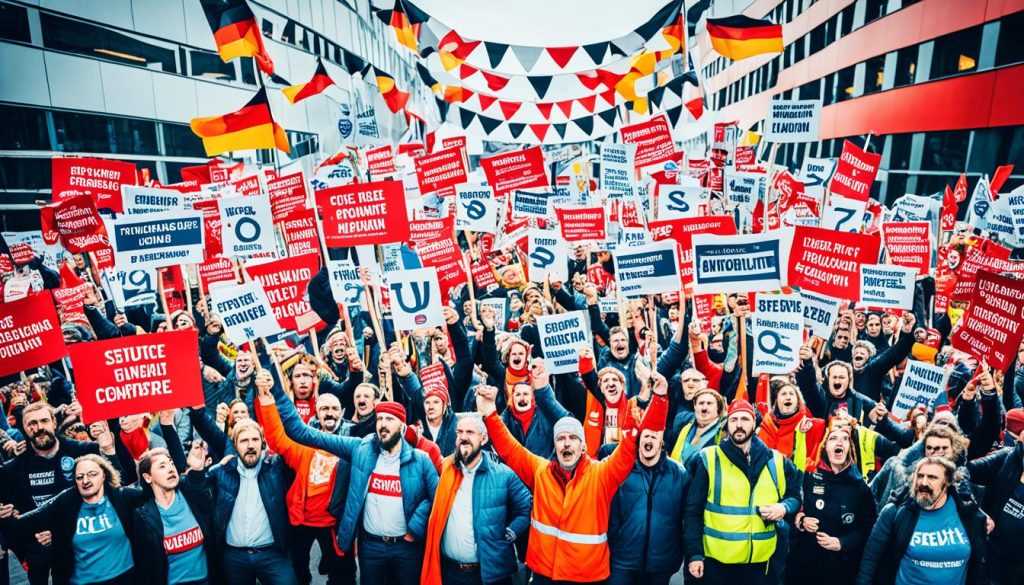Employees in Germany are protected under a strong set of laws. These laws make sure they are treated fairly at work. Things like worker entitlements, and the rights of labour in Germany, create a good work environment for everyone. By knowing about employment contracts, health and safety, working hours, and rules against discrimination, workers and employers can better understand German labour laws.
- Understanding Employment Contracts in Germany
- Health and Safety Regulations
- Employees in Germany have the Right to Fair Working Hours and Breaks
- Equal Treatment and Non-Discrimination
- Rights During and After Sickness
- Parental Leave and Maternity Protection
- Termination Protection and Rights upon Dismissal
- Privacy and Data Protection under GDPR
- Holiday Entitlements and Paid Leave
- Additional Employee Rights: Unions and Works Councils
- Understanding Compensation and Bonuses
- Source Links
Key Takeaways
- Germany provides a comprehensive suite of rights for employees under German employment law.
- Worker entitlements include health and safety regulations ensuring safe work environments.
- Labour rights in Germany encompass fair working hours, break entitlements, and overtime regulations.
- Non-discrimination policies are robust, promoting equality at the workplace.
- Parental leave and maternity protection are well-established, ensuring support for working parents.
Understanding Employment Contracts in Germany
When starting work in Germany, knowing about employment contracts is key. Employers must give workers a document stating job terms within a month, even though a written agreement isn’t always required by law. This document is vital for job security and makes everything clear for everyone.
Written Employment Contracts
Written job contracts in Germany cover important points. They include details like:
- How much you get paid, usually in Euros
- Benefits you receive
- How either side can end the contract
- Your working hours and holidays
Having these terms in writing helps both sides know their rights and duties. This creates a workplace where everyone is clear about the rules.
Minimum Wage Requirements
Germany really looks after its workers, making sure everyone earns a fair wage. The minimum wage in Germany started at €9.19 per hour and went up to €9.35 in 2020. But, trainees and some interns don’t fall under this rule.
Following these rules makes sure German contracts are fair. It means employees get treated well and are paid fairly.
Health and Safety Regulations
In Germany, employers must follow strict health and safety rules to protect their workers. They have to check all work conditions closely. The goal is to spot dangers and decide on the right safety actions.
Risk Assessment and Management
Doing a thorough risk check is key in German workplaces. Employers look at the work environment and how things are done. They make sure any risks found are handled well. They also keep checking and updating these assessments to stay current.
Occupational Safety Measures
After finding risks, it’s a must to put in the right safety steps. These steps might involve changing how the workspace is set up or introducing new safety practices. In Germany, if a business has more than twenty workers, it must have a special safety officer. This person makes sure the company follows all safety rules and keeps the workplace safe. Not doing this can result in big fines or even legal trouble, showing how critical it is to meet these strict safety standards.
Employees in Germany have the Right to Fair Working Hours and Breaks
In Germany, employees have clear rights about their hours, breaks, and overtime. Knowing these rights can boost happiness and effectiveness at work.
Standard Working Hours
In general, employees in Germany should not work more than 48 hours a week. Workers can ask for shorter hours if they’ve been there at least six months and the business has over 15 staff. This change makes it easier to balance work and personal life.
Break and Rest Periods
Taking breaks is key to keeping workers happy and healthy. German law requires breaks based on how long someone works. For 6 to 9 hours of work, a 30-minute break is needed. Over 9 hours means a 45-minute break. These rules help lessen stress and boost well-being.
Overtime Regulations
Germany also has rules for overtime to protect employees. Overtime should be safe and not harm health. Workers should get extra pay or time off for overtime. It’s best if employers and workers talk this out to keep things clear and fair.
Equal Treatment and Non-Discrimination

In Germany, workplace equality is vital for employment rights. The German Equal Treatment Act bars all forms of discrimination at work. It covers discrimination based on age, disability, race, religion, gender, and sexual orientation. This ensures everyone is treated fairly in German workplaces.
Non-discrimination laws identify several discrimination types, such as:
- Direct Discrimination: When someone is treated worse due to personal traits.
- Indirect Discrimination: When a rule unfairly targets specific groups over certain characteristics.
- Victimisation: When a worker is harmed for complaining about discrimination or helped someone who did.
The German Equal Treatment Act sometimes allows for exceptions. This is if certain job requirements are critical for a position. Yet, these exceptions are closely checked to make sure they don’t go against the aim of non-discrimination laws.
The objective of these rules is to create a welcoming and fair workplace. Here, everyone, regardless of their background or identity, has the same chances and protections.
Rights During and After Sickness
Knowing your sickness rights in Germany is key to getting the right support when you’re ill. Workers who can’t work due to health issues are well protected in Germany. Here, we’ll look into what sick leave you can get and the sickness benefits available.
Sick Leave Entitlements
In Germany, if you’re sick and can’t work, you’re paid for up to six weeks. You can get this sick leave again for different illnesses. Or if six months to a year has passed since your last sick leave. Remember to tell your boss and show a doctor’s note to prove you’re sick.
Sickness Benefits
After six weeks of sick pay, you can get German sickness benefits from your health insurance. This money helps you keep getting some income while you heal. You can get up to 70% of your usual wage, but there’s a top limit. This support lets you focus on getting better without worrying too much about money.
Parental Leave and Maternity Protection

In Germany, parents get a big helping hand. They can take up to three years off until their child is three years old. They can also work part-time during this period to keep a balance between life and work.
Parental Leave Policies
Parental leave in Germany supports both mums and dads. They can take it all at once, or in sections, depending on what their family needs. This makes it easier for families to plan their time off work.
While on leave, parents have the option to work up to 30 hours a week. This way, they can keep moving forward in their careers and still enjoy the benefits of parental leave. When the leave ends, they can go back to their job or a similar one, keeping their work life secure.
Maternity Leave Regulations
Germany’s maternity protection helps mums both before and after their baby arrives. It starts six weeks before the due date and goes on for eight weeks after birth. In this time, mums can’t work but still get their full pay based on their average income from the last three months.
There’s also the ‘Parental Allowance Plus’ scheme, giving extra money to parents. It helps parents start working part-time again by offering more financial support, making the move back to work smoother.
Termination Protection and Rights upon Dismissal
In Germany, workers have strong rights if they are let go. This does not count during trial periods or for some short-term jobs. People usually get these rights after working more than six months. Reasons for firing include poor behaviour, personal issues, or big company changes.
A key rule is that firing someone has to be in writing with reasons given. The firing must follow set steps to be legal.
Some workers, like those with disabilities, pregnant, or on parental leave, get extra protection. They can’t be fired without the government saying it’s okay. This shows Germany’s strict rules against unfair firing.
Knowing and following these rules helps respect and protect workers’ rights in Germany. It’s important for both bosses and employees to understand these rights for a fair workplace.
Privacy and Data Protection under GDPR

In Germany, it’s essential to follow GDPR rules to protect employee data. The GDPR sets strict guidelines on handling personal information, especially at work. It’s crucial for bosses to manage sensitive data carefully to guard their employees’ privacy rights.
Employee Consent
Getting clear permission from employees is a key part of following GDPR in Germany. Bosses must make sure this okay is freely given and well-informed. It often needs to be in writing or another clear form. If the consent isn’t right, using personal data can be seen as illegal, and companies could face fines.
Processing Personal Data
Employers can process personal data for several legal reasons under GDPR. Mainly, it’s for work-related needs like meeting legal duties or sticking to agreements with unions. Special types of data, such as health info, get extra safeguarding against misuse. This careful handling of personal data is very important for protecting employees and keeping in line with GDPR at work.
Holiday Entitlements and Paid Leave
In Germany, workers get at least 24 working days off every year, if they work six days a week. This rule helps make sure people have time for rest and fun with family. It keeps employees happy and healthy.
When someone starts a new job in Germany, they might have to work for six months to get their full holiday benefits. But, many bosses give more holidays and extra bonuses. They know that taking breaks is important for the mind and body.
If you’re leaving your job, it’s important to figure out any holidays you haven’t taken. German law is very clear about this, making sure you get paid for days off you didn’t take. Such rules protect workers’ rights to take breaks, even when they’re moving on from a job.
Some workplaces give more time off than the law requires. They want to show they care about their staff’s happiness. This kind of thing makes people enjoy their jobs more and stay loyal to their company.
Additional Employee Rights: Unions and Works Councils

In Germany, German trade unions are key in making agreements on wages, hours, and standards. Employees can shape their work life. They have rights to representation.
Workers can join German trade unions and help shape workplace policies. They can start or choose works councils. These councils work with employers on employment issues.
Works council participation lets employees make their voices heard. They can influence their work environment. This right goes beyond just being in a union. It lets workers have a say in workplace decisions.
Understanding Compensation and Bonuses
In Germany, figuring out pay and bonus systems is crucial for both bosses and workers. The pay structure there includes different types of bonuses and extras. Workers might get extra pay, share in profits, or bonuses for good work, tough jobs, or special tasks.
It’s important to know that pay deals often go above the minimum wage in Germany. This shows how much companies value their teams. It also shows Germany’s effort to make sure pay is fair and competitive. For workers, it’s key to grasp these details when talking about job contracts or looking at job offers.
When it comes to bonuses, what you get can change based on the company and the job. Many German companies give yearly bonuses to thank their staff for their hard work. You might also get extra bonuses for hitting certain goals, pushing everyone to do well. These bonuses are a big part of pay in Germany, so knowing what you could get matters.











